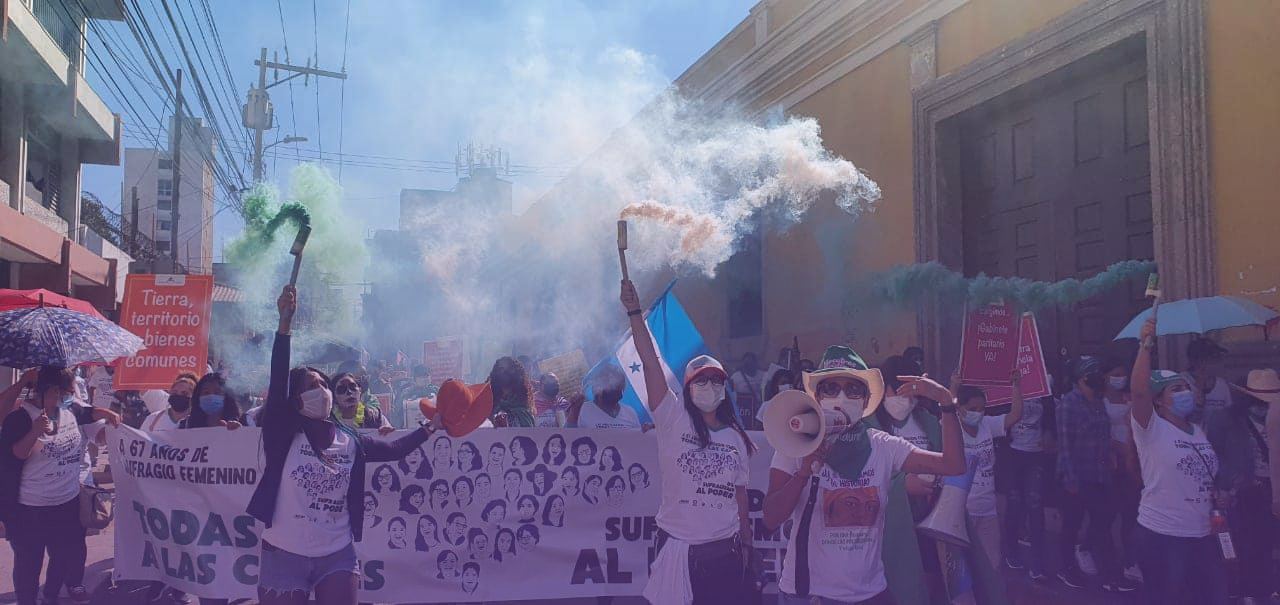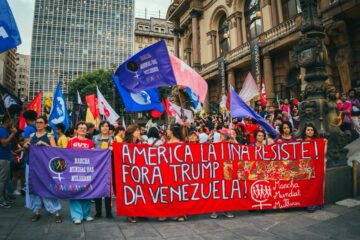Since 2009, Honduras has been undergoing a process of institutional deterioration. The coup that happened that year against former President Manuel Zelaya was, as they say, the last straw. The coup took place when a popular consultation was being proposed on the subject of reelection – which was not such a structural problem when compared to the deeper issues we have as a country. Zelaya’s proximity to social movements put powerful groups on the alert, both nationally and internationally.
The coup d’état marked a new point in history for us, Honduran men and women. Honduras was at the center of US geopolitical interests for economic domination of the Americas. Currently, the United States acts according to its interests in the Central American region, but knowing that it has lost Nicaragua, Costa Rica, El Salvador, that it has serious problems with Guatemala, they do not want to lose Honduras. The US interest in Honduras is due to the country’s military apparatus, the military bases that exist here, including the air base Coronel José Enrique Soto Cano, known as Palmerola, the largest US military base in Central America.
Change of government, change of project
We believe that the last eight years of Juan Orlando Hernández’s government established a drug trafficking dictatorship in our country. With the loss of the State, the social and economic conditions and the basic rights of the Honduran population were dismantled. We do not have the money to create the necessary policies because we have become an indebted country. Therefore, the victory by Xiomara Castro, of the Liberty and Refoundation Party [Partido Libertad y Refundación – Libre], in the last presidential election represents a conjunctural victory, which happened due to the need to return to a period of institutional strength.
Xiomara’s victory could be the beginning of the process of more impactful change that we want as Hondurans. However, this victory can also be heavily conditioned by the country’s powerful groups. The victory is the result of a coalition between three political parties: the Liberty and Refoundation Party [Partido Libertad y Refundación (Libre)], the Savior Party of Honduras [Partido Salvador de Honduras (PSH)], and the Innovation and Unity Party [Partido Innovación Nacional y Unidad (PINU)]. The Libre Party was created in 2011, after the coup d’état and an intense social uprising. It holds a diversity of positions more geared towards the left, although sometimes their actions are not in line with the left.
Therefore, our outlook is that two doors have been opened: on the one hand, power, on the other, the demands of the Honduran people.
More than ever, social and land movements must be organized, because we will be the pillars of support for this government if we want it to remain standing. his is a big move forward from the meager democracy and institutional strength of the last 12 years.
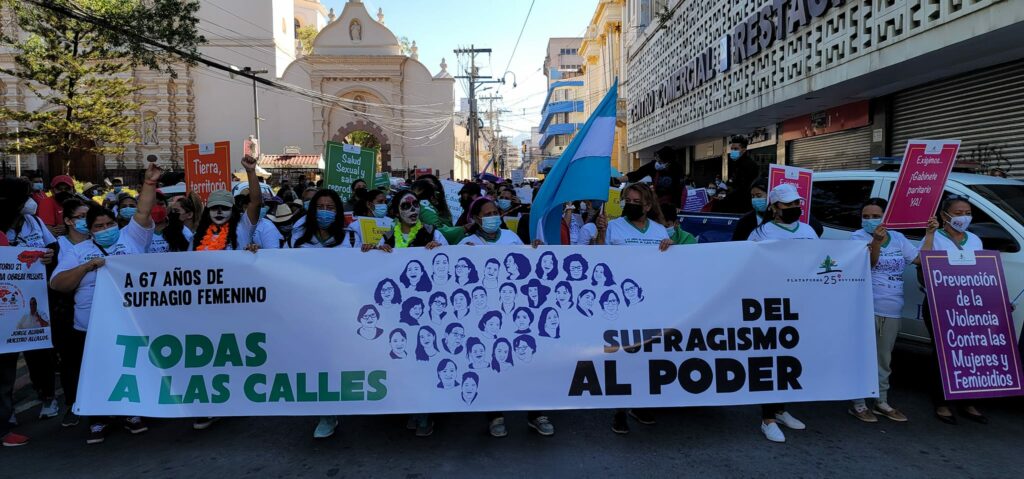
In defense of feminist politics
Throughout the campaign, there were misogynistic reactions, marked by hatred, which are resurfacing now after Xiomara’s inauguration. Never before in the country’s history had a woman been elected president. The struggle for women’s right to vote in Honduras lasted 67 years, and 67 years more to have a female president. We had also never won an electoral process with 1.7 million votes, as happened in November 2021.
Xiomara’s candidacy was not born in the feminist movement, but it was undoubtedly born with the support of the post-coup generation that awakened the feminist movement. On August 19, 2021, we women made a pact for human rights with the new president based on the November 25th Platform [Plataforma 25 de Noviembre] – a political space that brings together feminist organizations and is part of the World March of Women.
From the lessons we’ve learned, we know that just having a female candidate is not enough. We must address the fight for political, party and State structures that are currently not made for the participation of women in government spaces. It is a great challenge to fight against the patriarchy installed in the parties and in the structure of the State. We are experiencing first-hand: when Xiomara’s cabinet was formed, among the 31 appointments, only ten were women.
One of the challenges of the feminist movement is to increase women’s participation based on our feminist commitments. It is not enough to be a woman if you are not a feminist.
We need men and women who identify with class struggles and are committed to social struggles to be present in all decision-making spaces, in a pragmatic way, not just in the discourse. The bet on the refoundation of patriarchal structures in State and political parties is a huge challenge for the feminist moment.
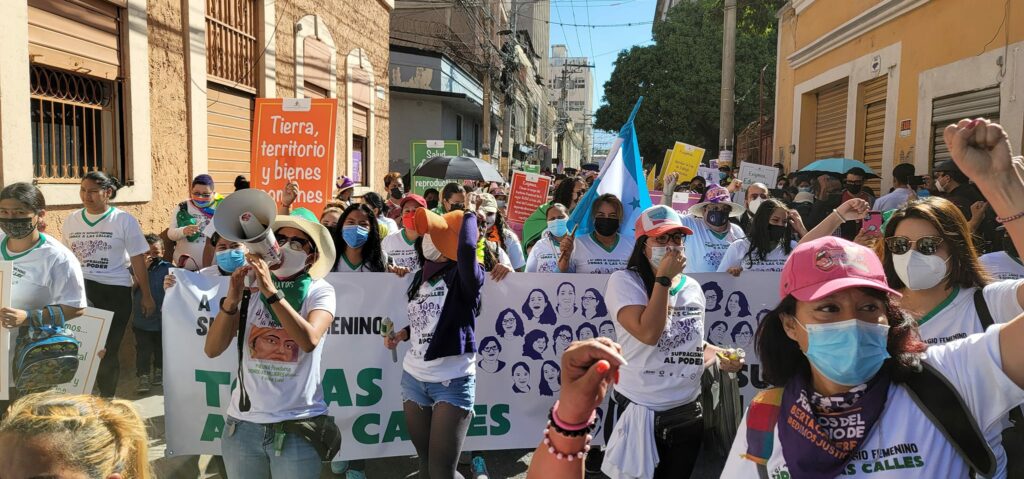
Developing democracy and ensuring rights
Currently, an eviction of 120 peasant families is taking place in the Lenca indigenous community called Tierras del Padre. Also under debate is the case of the community of Guapinol River defenders. There is a fear that people will be sentenced by the Prosecution Office to up to 36 years for defending life and the environment. How far does the power struggle need to go so that people are not criminalized for defending land, water and forests?
It is not enough to reach the presidency, because we live in a State that is divided into three powers. The Judiciary is an accomplice of the country’s powerful groups. Given this, how can we present our demands and claim our right to land? The challenge must be faced head on: reestablishing our homeland, recovering democracy in the country and putting it at the service of the majority of the people/population.
Women’s rights are also not upheld. In 2021, 350 women were murdered and, in 2022, we have already had more than 30 women murdered in January alone. On February 8th, it was one year since the death of our colleague Keyla, murdered inside a police station, at the hands of police officers. We demand a comprehensive strategy against femicides and rapes. As peasants, we demand access to land for our sistes. All this involves the recovery of democracy and institutional strength, with the powers working for the people and for women.
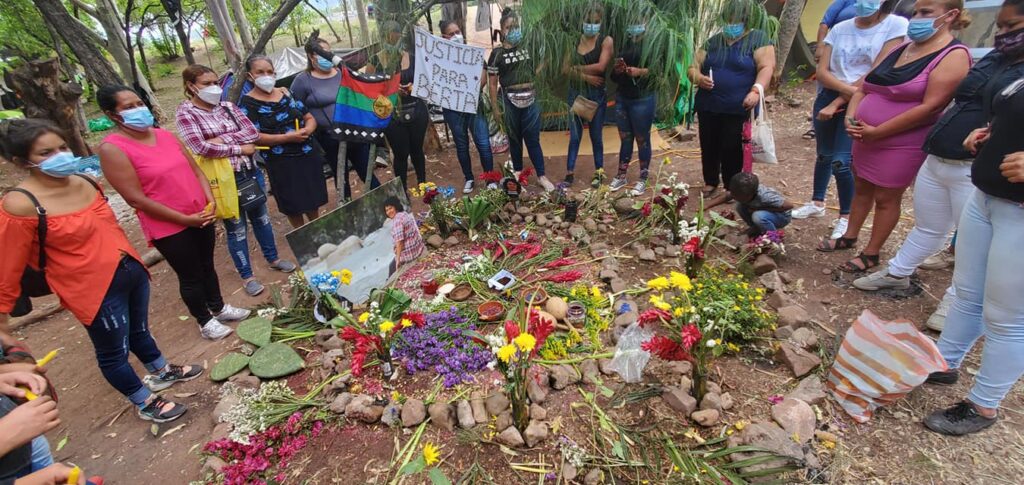
In defense of the freedom to organize, work and live in our territories
The matter of political persecution in Honduras is very shocking. People who defend human rights are threatened daily. But the persecution will not stop if the powerful and their structure remain intact. We are concerned about the lack of justice and the paramilitary groups that have promoted persecution and bloodshed.
We continue to demand justice for Berta Cáceres, a commitment made by the president in her speech after her inauguration. The case is not closed, as those really responsible for the murder are still not paying for their crime. Berta Cáceres’ family and the indigenous movement as a whole are articulated. The Black Fraternal Organization of Honduras [Organización Fraternal Negra Hondureña – Ofraneh] has spent the last three years demanding answers about the disappearance of their colleagues, and still no investigation has been opened. It has also demanded that their land be legalized to end spoliation. The armed forces and the military apparatus established by Juan Orlando Hernández impose themselves on the territories, causing numerous violations on a permanent basis.
We have been clear in our support for this government, but we have also been clear when we state that, in the absence of responses or progress in our agendas, we will go to the streets, presenting our demands, because we are a popular movement.
Four years will not be enough to reestablish this country that has been under domination for over a hundred years. That is why we have to keep following cases and demanding peace and freedom to organize. At the same time, we are joining forces to build a National People’s Constituent Assembly, with broad participation from women. Social and popular movements are organizing into committees, in which all sectors of the social struggle will be present. We will be able to present our issues, an opportunity we have not had in the last 12 years. On the contrary, we have been bashed, criminalized, murdered and imprisoned.
___
Wendy Cruz and Yamileth Gonzáles are members of the November 25th Platform and the World March of Women in Honduras.

